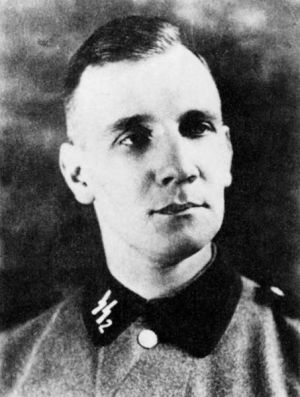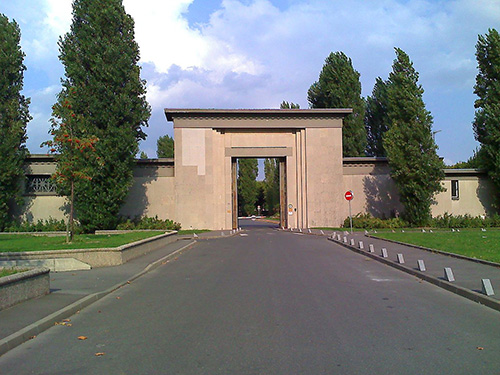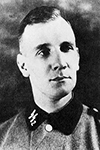Prewar years
Introduction
One of the most remarkable German resistance men is the protestant mining engineer Kurt Gerstein. As an SS-officer he was co-responsible for the delivery of Zyklon-B to Auschwitz. In Belzec's extermination camp he witnessed how hundreds of Jews were gassed. Shocked by what he saw, he tried to make contact with representatives of neutral countries, the Catholic and Protestant churches and the Dutch resistance. He hoped that his testimony would be made public and that the world leaders, among whom the pope, would make a stand against this genocide. But instead he encountered unbelief and indifference.This article is an abridged version of the book 'De boodschapper uit de hel' ('The messenger from hell') by the same author.
Youth and academic years
Kurt Gerstein was born in Münster in Westphalia on August 11, 1905. His father, Ludwig Gerstein, was a judge and came from a respected Lutheran family of doctors, lawyers and entrepreneurs. Together with his wife, Clara Gerstein Schmemann, he had seven children, of which Kurt was the sixth. Kurt was not an exemplary student, his grades were bad, he skipped school regularly and played practical jokes in the classroom. He was rebellious at home and he was considered the black sheep. Strikingly enough, this recalcitrant young man was looking for an approach to Christianity and he grew into an inspirational youth leader in the Protestant Youth Movement.
The rise of the NSDAP (National socialist German Workers Party) did not pass the Gersteins unnoticed. On May 1st, 1933, Ludwig Gerstein allowed his sons to become member of the party. Five months later, Kurt also joined the Sturmabteilung (SA). Shortly after the seizure of power by the Nazi's he seemed convinced that he could combine his faith with loyalty to the party. This changed when the Nazi´s began to pursue an increasingly antireligious policy. In vain he objected to the inclusion of Protestant youth organizations in the Hitlerjugend. On January 30, 1935, there was an open confrontation between Gerstein and national socialists in the city theatre of Hagen where the anti-Christian play Wittekind was performed. When one of the actors spoke about Christ in a negative way, he loudly expressed his protest, after which party members gave him a "decent thrashing".
Conflicts with the regime
Meanwhile, Gerstein graduated in June 1931 as an engineer. He continued to study to achieve an even higher degree in Mining Engineering (Bergassessor) in November 1935. That same month in Berlin, he became engaged with Elfriede Bensch, the daughter of a Lutheran pastor whom he married in 1937. In 1936 he joined the Saar mines as a civil servant. There, he would only work a mere few months, because on September 24, 1936 he was arrested in Saarbrücken by the Gestapo. He had been reported to the infamous secret police department after playing a practical joke with the invitations to a meeting of the German Miners Association. The text contained some satirical comments that could be considered offending by party members. During a search of his home, letters and Christian pamphlets containing critical remarks with regard to the regime were found, that Gerstein had meant to distribute among staff members of justice and ministry departments. As a result, he was detained for six months, lost his job at the Saar mines and was dishonourably discharged from the NSDAP.
Soon after his release Gerstein tried to be rehabilitated in the party. His first attempt proved to be in vain and since he was now unemployed, he undertook a study in medicine at the Deutsches Institut für Ärtzliche Mission (German Institute for Medical Mission) in Tübingen. There, he made contact with a group of German nationalists who opposed Hitler which brought him again in conflict with the authorities. In May 1937 he received a nationwide ban on public speaking and about a year later he and other members of the group were arrested. On July 14, 1938, Gerstein was detained in camp Welzheim, where he was kept for six and a half weeks. With the help of a protestant Gestapo employee Gerstein was released on August 28, 1938. Beaten down during his captivity he abstained from oppositional activities for the time being.
Assisted by his father, Gerstein tried again to be rehabilitated by the party. In August 1940 he visited the Braune Haus, the party headquarters of the Nazi's in Munich. There he was told that only Hitler himself could decide about full rehabilitation, but that he did not take into consideration any such requests at that moment. An official of the supreme court of law indicated that Gerstein, in order to make his case more credible, should prove himself as a true national socialist. A possibility to that end was to join the 'Schutzstaffel' (protection squad) (SS). Membership of the NSDAP was not required to join. Presumably that very year (1940) he reported himself as a volunteer.
Definitielijst
- Jews
- Middle Eastern people with own religion that lived in Palestine. They distinguished themselves by their strong monotheism and the strict observance of the Law and tradition. During World War 2 the Jewish people were ruthlessly persecuted and annihilated by the German Nazis. . An estimated 6,000,000 Jews were exterminated.
- Nazi
- Abbreviation of a national socialist.
- NSDAP
- Nazi Party, byname of National Socialist German Workers' Party, German Nationalsozialistische Deutsche Arbeiterpartei (NSDAP), political party of the mass movement known as National Socialism. Under the leadership of Adolf Hitler , the party came to power in Germany in 1933 and governed by totalitarian methods until 1945.
- resistance
- Resistance against the enemy. Often also with armed resources.
- Sturmabteilung
- Storm detachment. Semi-military section of the NSDAP. Founded in 1922 to secure meetings and leaders of the NSDAP. Their increasing power was stopped during “The night of the long knives”, 29 and 30 June 1934.
- Zyklon-B
- Poison gas that was systematically used in German extermination camps, primarily to murder Jews.
Images
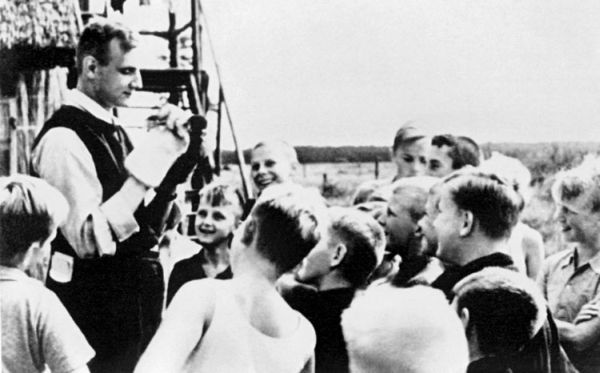 Gerstein with Christian youths. Source: Landeskirchliche Archiv der Evangelischen Kirche von Westfalen.
Gerstein with Christian youths. Source: Landeskirchliche Archiv der Evangelischen Kirche von Westfalen.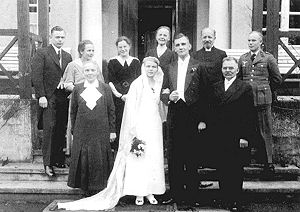 Wedding of Kurt and Elfriede Gerstein, November 1937. Source: Berlin Lexikon.
Wedding of Kurt and Elfriede Gerstein, November 1937. Source: Berlin Lexikon.Nazi and resistance man
Linking up with the SS
In the spring of 1941, Kurt Gerstein joined the Waffen-SS. He himself claimed that his membership was a deliberate act of resistance. He wanted to know more about the activities of the SS from within. One of the reasons for his decision to join the Waffen SS was to determine the death of his mentally disabled sister-in-law Bertha Ebeling, who resided in the psychiatric institution in Hadamar. She was a victim of the secret Nazi euthanasia program that claimed the lives of 80,000 or more mentally disabled people in the country between October 1939 and August 1941. However, his application to the SS actually took place before he knew of her death in the beginning of 1941.
From March to June 1941 Gerstein attended basic military training in Hamburg-Langenhorn, Arnhem and Oranienburg. During his stay in Arnhem, he regularly visited an old friend, the Dutch engineer Herman Ubbink, with whom he had attended the Christian student association in Aachen in the late 1920's. He seemed not to have swallowed his criticism of the Nazis entirely. "Our discussions had the subject of war and national socialism," Ubbink said. There he showed himself to be an ardent opponent of National Socialism.
Gerstein completed his training period successfully. Due to his combined technical and medical knowledge, he was transferred in June 1941 to the Hygiene Institut der Waffen-SS. This institute engaged in research in the fields of chemistry, parasitology, bacteriology and water hygiene. Within the institute, he personally worked on two successful projects to improve hygiene at the front: a mobile delousing facility for uniforms and other laundry and a mobile plant for water filtration and disinfecting. His superiors were pleased with Gerstein and in November 1941 he was promoted to SS-Untersturmführer
In January 1942, Gerstein was appointed chief of the department Gesundheitstechnik (Health technology), developed by himself, there he was responsible for the disinfection with highly toxic gases. It was this responsibility that brought him in contact with the extermination of the Jews in the extermination camps in Poland. According to Gerstein, it began with a visit by SS-Sturmbannführer Rolf Günther on June 8, 1942. This was the deputy of Adolf Eichmann (Bio Eichmann), the chief of the department within the Reichssicherheitshauptamt (Main office of state security), who was engaged in the coordination of the deportations of the European Jews to the extermination camps. "He (Günther) instructed me to deliver an extremely secret government order of 100 kg of Prussic acid immediately," Gerstein claimed, "and to bring them by car to an unknown location known only to the driver of the car. A few weeks after Günther's visit, in August 1942, Gerstein left for his special mission. Gerstein's travelling companion was SS-Obersturmbannführer Wilhelm Pfannenstiel, a professor of hygiene and bacteriology.
Belzec
Before the two men visited the secret travel destination, two other locations were called at. First, a stock of Zyklon-B, supplied in sealed cans, had to be collected in Kolin, nearby Prague. Kaliwerke Kolin A.G. was one of the producers of this poison gas that was used in Auschwitz and Maidanek for gassing Jews. The fact that Zyklon-B was used to kill people was already known by Gerstein, because at the end of the war he wrote in a report that he had "deliberately made it clear in the factory that the acid was meant to be used for killing people".
Following the visit to the factory, Lublin in the east of the General Government was the next travel destination. There, they met SS-Brigadeführer Odilo Globocnik (Bio Globocnik), whose headquarters of SS- und Polizeiführer of the Lublin-district were located in that town. He was in charge of AKtion Reinhard, the extermination of the Jews in the General Government. Globocnik told Gerstein about the gas chambers of the extermination camps Belzec, Sobibor and Treblinka where Jews were killed in gas chambers by means of carbon monoxide from the exhausts of engines. Gerstein had to investigate whether Zyklon-B could be used for that purpose instead. After visiting Globocnik, Gerstein and Pfannenstiel travelled to Belzec, where they witnessed the extermination process in practice.
After some experiments with a few small transports of Jews in February 1942 to determine the efficiency and capacity of the gas chambers, Belzec became officially operational from March 17.
From mid-March till mid-June 1942, approximately 93.000 Jews were already exterminated. The first commander of the camp was SS-Hauptsturmführer Christian Wirth (Bio Wirth). On the second day of their visit to Belzec they met him. Wirth showed them that morning how a transport of Jews was being "processed". According to Gerstein, it concerned a train from Lemberg, consisting of 45 wagons with 6,700 people, of which 1,450 were already dead on arrival. The gassing took longer than usual because the engine that produced the exhaust fumes refused to start. According to Gerstein, it took almost 3 hours before it worked and after that another half hour was required before all people were killed.
Despite the fact that Gerstein accidentally witnessed the fact that gassing did not work smoothly, due to the temporary malfunction of the engine, no changes were made in the extermination camp. Wirth refused to proceed with the use of Zyklon-B.
Gersteins mission
Gerstein was shocked by the massacre he had witnessed in Belzec. Returning from Poland to Germany in the express train from Warsaw to Berlin, he met baron Göran von Otter, the secretary of the Swedish ambassador in Berlin. Gerstein accosted the diplomat and told him what he had seen, hoping that Von Otter could ensure that his information about the extermination camps could reach the Western Allies through Sweden. The Allies could then distribute pamphlets all over Germany, so that the entire murder operation would become known to the German people, which could subsequently rise against it. Gerstein hoped that the Nazi regime would then be forced to stop the extermination.The Swedish diplomat presented a detailed report of his conversation with Gerstein on the train to the Swedish ambassador. However, Sweden did nothing with the report and did not pass it on to the Allies. They were afraid to jeopardise their relations with Germany. The country was officially neutral, but it was dependent on Germany for the supply of necessary goods, due to the British sea blockade. Apart from the Swedish embassy, Gerstein sought numerous ways to convey his message to the Western Allies. He contacted the press attaché of the Swiss Embassy in Berlin, Paul Hochstrasser, but Switzerland also did not want to provoke Germany. Swiss neutrality was found more important than the fate of the Jews.
Kurt Gerstein also sought rapprochement to the Roman Catholic Church to urge the Pope to publicly condemn the extermination of the Jews. Soon after his visit to the extermination camps, he tried to make contact with the Apostolic Nuncio, the representative of the Vatican in Germany. As he visited the Apostolic Nuntiature in Berlin, he was denied all possibilities for an interview and was urged to leave the Papal embassy. The authority of the Catholic Church in Germany and the Vatican did not want to jeopardise their relation with Nazi Germany.
Dutch resistance
When Dutchman Herman Ubbink visited Gerstein in Germany on February 1943, Kurt saw a new opportunity to spread his message. Ubbink was the friend in the Christian youth movement in Aachen, with whom Gerstein had spoken various times about their shared aversion regarding the Nazi regime during his training for the SS in Arnhem. Gerstein asked him to forward his testimony to the authorities in Britain. Ubbink agreed. He informed a member of the resistance, only known by the name of Cor. The man's real name was Cornelis van der Hooft. He was a member of the National Organization for Aid to people in hiding and at work for the resistance papers Vrij Nederland and Trouw. On March 25, 1943 this resistance man compiled a report, based on Gerstein's testimony, which he gave the title 'Tötungsanstalten in Polen' (Killing facilities in Poland). The report was never published in the Netherlands by the illegal press, presumably because it was not believed.A copy of Gerstein's report was sent to London by the Dutch resistance. It was received on April 24, 1943 by the Dutch government. Not until August 16,1943 Prime Minister Pieter Gerbrandy ordered the Rijksvoorlichtingsdienst (RVD) (Public Information Service) to pass the information on to the Inter-Allied Information Committee, the official publicity agency of the ministries of information of the Allied governments in London. Despite repeated remarks by Gerbrandy, the committee probably never received the report. Gerstein's report remained in London's archives, where it was not recovered until 1992.
Zyklon-B
During the same period that Gerstein tried in vain to urge the world to stand up against the extermination of the Jews, he paradoxically committed himself to this destruction program. He conducted technical negotiations with the distributor of Zyklon-B and personally ordered a large amount of this poison gas. On April 20 of the same year he was promoted to SS-Obersturmführer. Meanwhile, he was also awarded the Kriegsverdienstkreuz 2. Klasse mit Schwertern. (War Merit Cross 2nd class with swords).Little is known about Gerstein's precise activities from 1942 to 1945. He later indicated that he visited several concentration camps during that period, including Mauthausen and Auschwitz-Birkenau. He is also supposed to have witnessed experiments on human subjects in the women's concentration camp Ravensbrück and he was aware that such experiments also took place in Buchenwald. More controversial, however, is his involvement in the delivery of Zyklon-B to concentration camps. Despite the fact that in the post-war litigation, it was extensively investigated whether the amount of Zyklon-B ordered by Gerstein was used to kill people, no concrete answer could be given.
Definitielijst
- Auschwitz-Birkenau
- The largest German concentration camp, located in Poland. Liberated on 26 January 1945. An estimated 1,1 million people, mainly Jews, perished here mainly in the gas chambers.
- concentration camp
- Closed camp where people are being held captive that are considered to be anti- social, enemies of the state, criminal or unwanted individuals. These groups mostly do not get a fair trial or are condemned to doing time in a camp.
- Jews
- Middle Eastern people with own religion that lived in Palestine. They distinguished themselves by their strong monotheism and the strict observance of the Law and tradition. During World War 2 the Jewish people were ruthlessly persecuted and annihilated by the German Nazis. . An estimated 6,000,000 Jews were exterminated.
- Mauthausen
- Place in Austria where the Nazi’s established a concentration camp from 1938 to 1945.
- mid
- Military intelligence service.
- national socialism
- A political ideology drawn up by Hitler based on the superiority of the German race, the leader principle and fierce nationalism that was fed by the hard Peace of Versailles. National socialism was anti-democratic and racist. The doctrine was elaborated in Mein Kampf and organised in the NSDAP. From 1933 to 1945 National socialism was the basis of totalitarian Germany.
- Nazi
- Abbreviation of a national socialist.
- neutrality
- Impartiality, absence of decided views, the state of not supporting or helping either side in a conflict.
- resistance
- Resistance against the enemy. Often also with armed resources.
- socialism
- Political ideology aiming at slight or no class differences. Means of production are owned by the state. Evolved as a response to capitalism. Karl Marx tried to substantiate socialism scientific.
- Waffen-SS
- Name of Military section of the SS.
- Zyklon-B
- Poison gas that was systematically used in German extermination camps, primarily to murder Jews.
Images
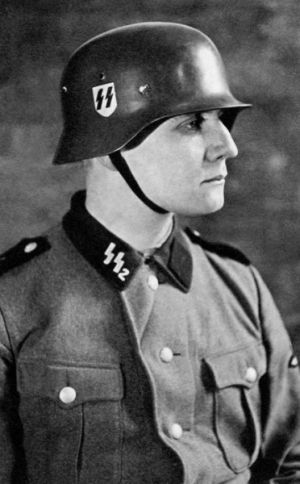 Kurt Gerstein in the uniform of the SS. Source: Landeskirchliche Archiv der Evangelischen Kirche von Westfalen.
Kurt Gerstein in the uniform of the SS. Source: Landeskirchliche Archiv der Evangelischen Kirche von Westfalen.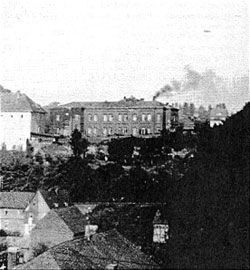 Smoke clouds from the crematorium of the euthanasia establishment at Hadamar. Source: Holocaust Education & Archive Research Team.
Smoke clouds from the crematorium of the euthanasia establishment at Hadamar. Source: Holocaust Education & Archive Research Team.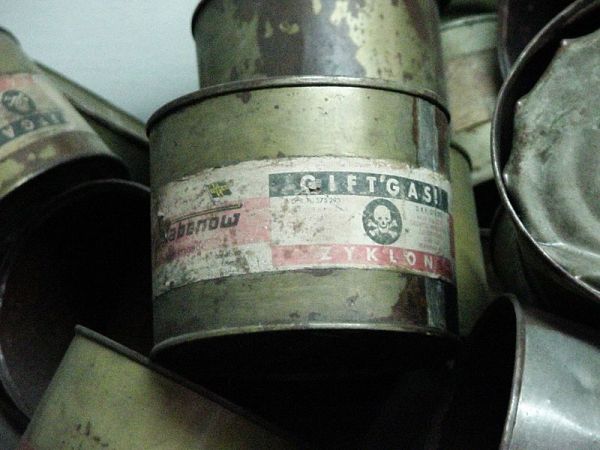 Cans of Zyklon-B, as collected by Gerstein, in Kolin, near Prague. Source: Michael Hanke.
Cans of Zyklon-B, as collected by Gerstein, in Kolin, near Prague. Source: Michael Hanke.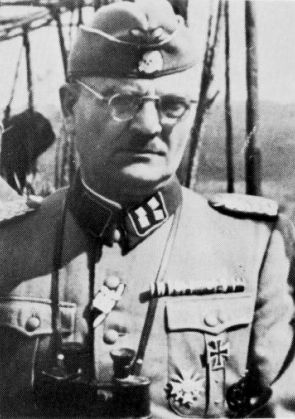 Christian Wirth, the commander of Belzec who showed Gerstein the operation of the annihilation procedures. Source: Yad Vashem.
Christian Wirth, the commander of Belzec who showed Gerstein the operation of the annihilation procedures. Source: Yad Vashem.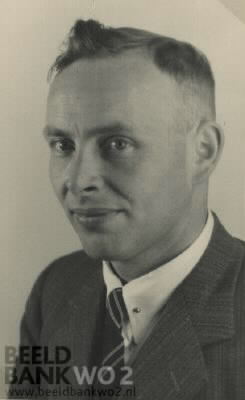 Cornelis van der Hooft, the Dutch resistance man who, on the basis of Gerstein's testimony, produced a report of the destruction camps in Germany. Source: Beeldbank WO2.
Cornelis van der Hooft, the Dutch resistance man who, on the basis of Gerstein's testimony, produced a report of the destruction camps in Germany. Source: Beeldbank WO2.Death and posthumous recognition
In Allied hands
The awareness of crimes committed by the organization in which he himself was active and the failure of his efforts to warn the world about it, had a great influence on Gersteins state of mind. In both the spring and autumn of 1944 he was admitted to a hospital, presumably due to health problems related to his diabetes. Being tormented by guilt, it was presumably his faith and the will to testify after the war that kept him going.In the second half of March 1945 Gerstein left Berlin. After having stayed with his family in Tübingen for a short period, he reported to the French army in Reutlingen on April 22, 1945. Shortly thereafter, the French commander in Reutlingen sent him to the southerly Rottweil am Neckar. He was given a statement with the following text: "The proprietor of this document is not a true SS person and may not be treated as such but with all allowances". In Rottweil he was accommodated in hotel Mohren. Here he wrote in French a report on the massacre in Belzec, which he later translated.
In captivity
In May, Gerstein requested the Allied authorities for permission to return to his family in Tübingen. It would not come to that, for on May 26, 1945 he was picked up by two officers of the French intelligence service in Rottweil. They brought him to Konstanz, a place located on the Swiss border. From there he was transferred to Paris in early June, which had been liberated in August 1944. For about a month he was detained in the French capital in a building on Rue de Villejust, which belonged to the French intelligence agency. He was interrogated several times. Gerstein was no longer considered an important witness, on the contrary, it was considered to prosecute him as a suspect of war crimes. On July 5, Gerstein was transferred to the Paris military prison Cherche-Midi. An inquiry was opened to him "for murder and accomplice to murder".In the afternoon of July 25, 1945, Gerstein was found dead in his cell. According to the official version, Kurt Gerstein killed himself. However, there are also people, including his own wife, who did not believe he committed suicide. They are convinced that he was murdered by his guards or by German fellow prisoners who wanted to prevent him from speaking about Nazi crimes. Concrete evidence for this, however, is lacking. In the loneliness of his cell, he probably lost all hope, all his efforts had been in vain, suicide seemed the only way out.
War criminal
After his death, the body of Kurt Gerstein was buried on August 3, 1945, in the cemetery of the municipality of Thiais near Paris. Until the 1960's, hardly anyone in post-war Germany was interested in Gerstein's fate and resistance activities. The German government also showed little appreciation for Gerstein's resistance activities. When his wife applied for a widow's pension in October 1949, the question arose whether the widow of a former party member and SS officer should be eligible for this. The role of her husband was therefore investigated by the Denazification Tribunal in Tübingen in 1950. On 16 November 1950, Kurt Gerstein was sentenced posthumously to Belastete (seriously suspected), the second highest category in which Germans could be classified by a Denazification tribunal. The court attached great importance to Gerstein's involvement in the supply of Zyklon B to Auschwitz.As a result of this verdict, Elfriede Gerstein's request for a pension was denied as a result of this verdict, but much worse, she found her husband considered a war criminal. She appealed, but the higher court upheld the sentence. Ordering Zyklon/B at Degesch made Gerstein guilty of murder, because he knew what the gas was used for. Elfriede left the case lie for a few years, but in the summer of 1954 she submitted a petition for her husband to the prime minister of Baden-Württemberg. This was rejected, but it was decided that the Gerstein family was no longer accountable for the trial costs.
Rehabilitation
Meanwhile, in 1953 Gerstein's testimony of gassings in Belzec was first published in Germany by the historian Hans Rothfels. He described Gerstein as a consistent resistance fighter who, "despite his former party membership, had been a passionate, ethical-religious and explicit opponent of the Nazi church- and racial politics". A major influence on Gerstein's fame was Rolf Hochhuth's 1960's play Der Stellvertreter (Deputy). It was avowedly critical of Pope Pius XII's conduct during the war and raised the question of why he did nothing to stop the deportations to the extermination camps. In this highly romanticized play, Gerstein was raised as the opposite of the pope; his courageous actions were set against the crimes and cowardice of others. This play contributed strongly to turning the German public opinion in favour of Kurt Gerstein.Along with all the attention a campaign began for the rehabilitation of Kurt Gerstein. It was supported not only by friends of Gerstein and Protestant clerics, but also by the Secretary General of the Jewish Central Council in Germany. Finally, in 1965 followed the rehabilitation of Gerstein. On January 20, 1965 he was classified as Nichtbelastete (innocents) group by Kurt Georg Kiesinger, Prime Minister of Baden-Württemberg, who became Chancellor of the Federal Republic from 1966 till 1969.
Definitielijst
- Denazification
- Post war policy of the allies in Germany to punish Nazi war criminals and to remove known Nazis from positions of power or public service.
- Nazi
- Abbreviation of a national socialist.
- resistance
- Resistance against the enemy. Often also with armed resources.
- war crimes
- Crimes committed in wartime. Often concerning crimes committed by soldiers against civilians.
Images
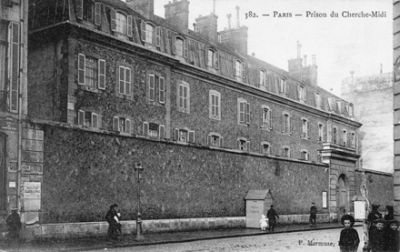 The Paris military prison Cherche Midi, where Gerstein committed suicide on July 25, 1945. Source: Collection Mémoire Vive.
The Paris military prison Cherche Midi, where Gerstein committed suicide on July 25, 1945. Source: Collection Mémoire Vive.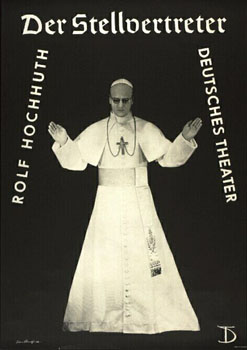 Poster of the play 'Der Stellvertreter' from 1963. Source: DHM.
Poster of the play 'Der Stellvertreter' from 1963. Source: DHM.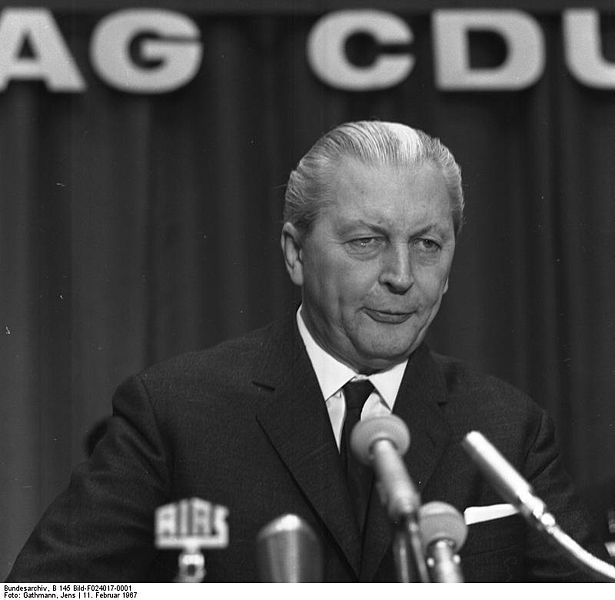 Chancellor Kurt Georg Kiesinger, who rehabilitated Gerstein in 1965 as minister of Baden-Württemberg. Source: Bundesarchiv.
Chancellor Kurt Georg Kiesinger, who rehabilitated Gerstein in 1965 as minister of Baden-Württemberg. Source: Bundesarchiv.Information
- Article by:
- Kevin Prenger
- Translated by:
- Cor Korpel
- Published on:
- 19-01-2025
- Feedback?
- Send it!
